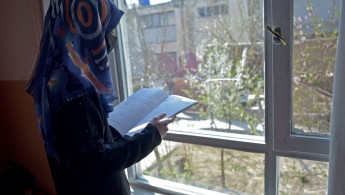Afghanistan: Founder of girls' school project arrested in Kabul
The founder of a project that campaigned for girls' education in Afghanistan has been detained by Taliban authorities in Kabul, his brother and the United Nations said Tuesday.
The Taliban government last year barred girls from attending secondary school and later university, making Afghanistan the only country in the world to issue such restrictions on education.
Matiullah Wesa, the head of PenPath was stopped by men outside a mosque after prayers on Monday evening, his brother Samiullah Wesa told AFP.
"When Matiullah asked for their identity cards, they beat him and forcefully took him away," he said.
"He has been arrested for his activities in the education sector. He never worked with anybody else, neither with the previous government. He only worked for PenPath."
A national hero of #Afghanistan and a friend of mine has been arrested by #Taliban today: Matiullah Wesa.
— Hannah Neumann (@HNeumannMEP) March 27, 2023
He brought education to those who long for it, no matter where, no matter who governs there.
We will fight for your release, Matiullah!#FreeWesa pic.twitter.com/s4PZ8lJg9l
The UN mission in Afghanistan confirmed in a tweet that Matiullah had been arrested.
Taliban officials have so far not responded to requests for comment.
PenPath campaigns for schools and distributes books in rural areas, and has long dedicated itself to communicating the importance of girls' education to elders in villages, where attitudes have been slowly changing.
Since the ban on secondary schools for girls, Wesa has continued visiting remote areas to drum up support from locals.
"Men, women, elderly, young, everyone from every corner of the country are asking for the Islamic rights to education of their daughters," he said in a tweet, hours before he was arrested.
Last week, as the new school year started without teenage girls, he vowed to continue his campaign.
"The damage that closure of schools causes is irreversible and undeniable. We held meetings with locals and we will continue our protest if the schools remain closed," he tweeted.
Taliban officials have so far not responded to requests for comment.
The Taliban government have imposed an austere interpretation of Islam since storming back to power in August 2021 after the withdrawal of the US and NATO forces that backed the previous governments.
Taliban leaders have repeatedly claimed they will reopen schools for girls once certain conditions have been met.
They say they lack the funds and time to remodel the syllabus along Islamic lines.
Taliban authorities made similar assurances during their first stint in power - from 1996 to 2001 - but girls' schools never opened in five years.
In a recent speech in Geneva, UN special rapporteur on human rights in Afghanistan, Richard Bennett said that the Taliban authorities' policy was to "repudiate the human rights of women and girls" in Afghanistan.
"It may amount to the crime of gender persecution, for which the authorities can be held accountable," he said.
The order against girls' education is believed to have been made by Afghanistan's supreme leader Hibatullah Akhundzada and his ultra-conservative aides, who are deeply sceptical of modern education - especially for women.
As well as sparking international outrage, it has stirred criticism from within the movement, with some senior officials in the Kabul government as well as many rank-and-file members against the decision.
Matiullah is the second leading educator to be arrested in recent months for campaigning for girls' education.
In February, the authorities detained veteran journalism lecturer, Ismail Mashal, after local media showed him carting books around Kabul and offering them to passersby.
It followed a live appearance on television in which he tore up his degree certificates to condemn the Taliban government's restrictions on women's right to work and education.
UN special rapporteur Bennett expressed alarm at Matiullah's arrest: "His safety is paramount & all his legal rights must be respected."
"Raise your voice for him," added Pashtana Zalmai Khan Durrani, the head of Afghan non-profit education provider Learn.





 Follow the Middle East's top stories in English at The New Arab on Google News
Follow the Middle East's top stories in English at The New Arab on Google News

![MP Essam Diab's pursuit to block TikTok in Egypt has revived an already ongoing debate in the country. [Getty]](/sites/default/files/styles/image_330x185/public/1230748046.jpeg?h=a5f2f23a&itok=-8MqBLLC)
